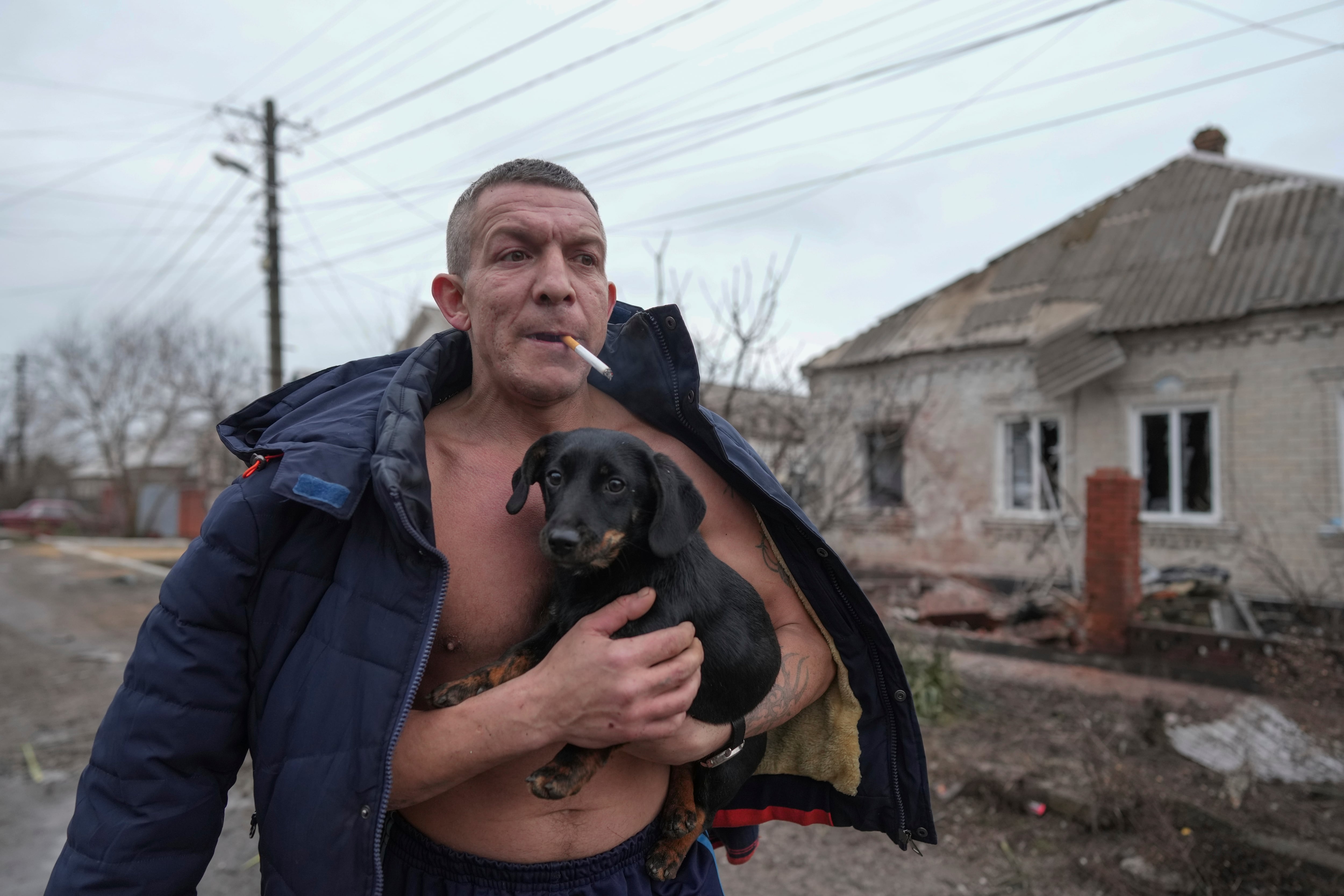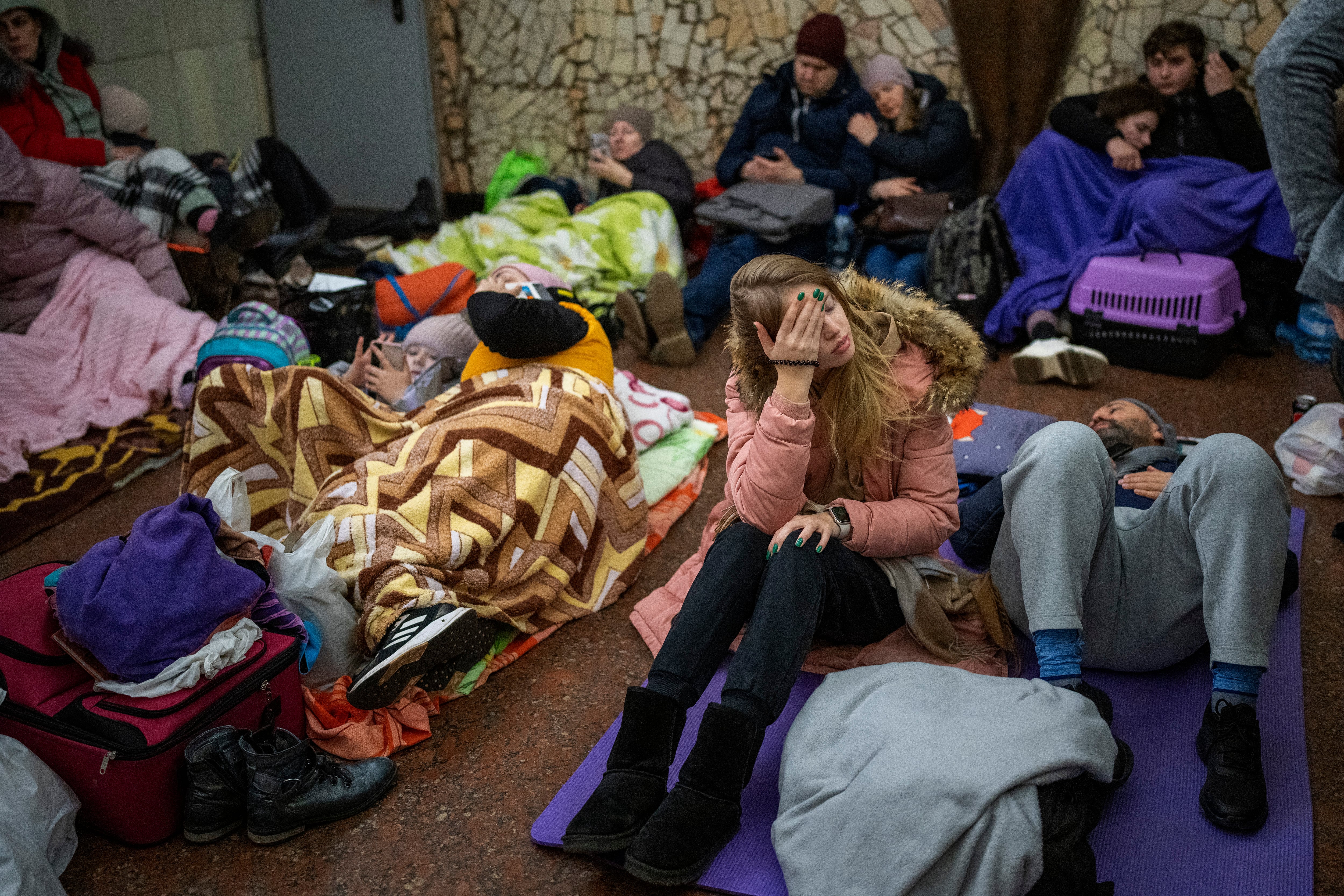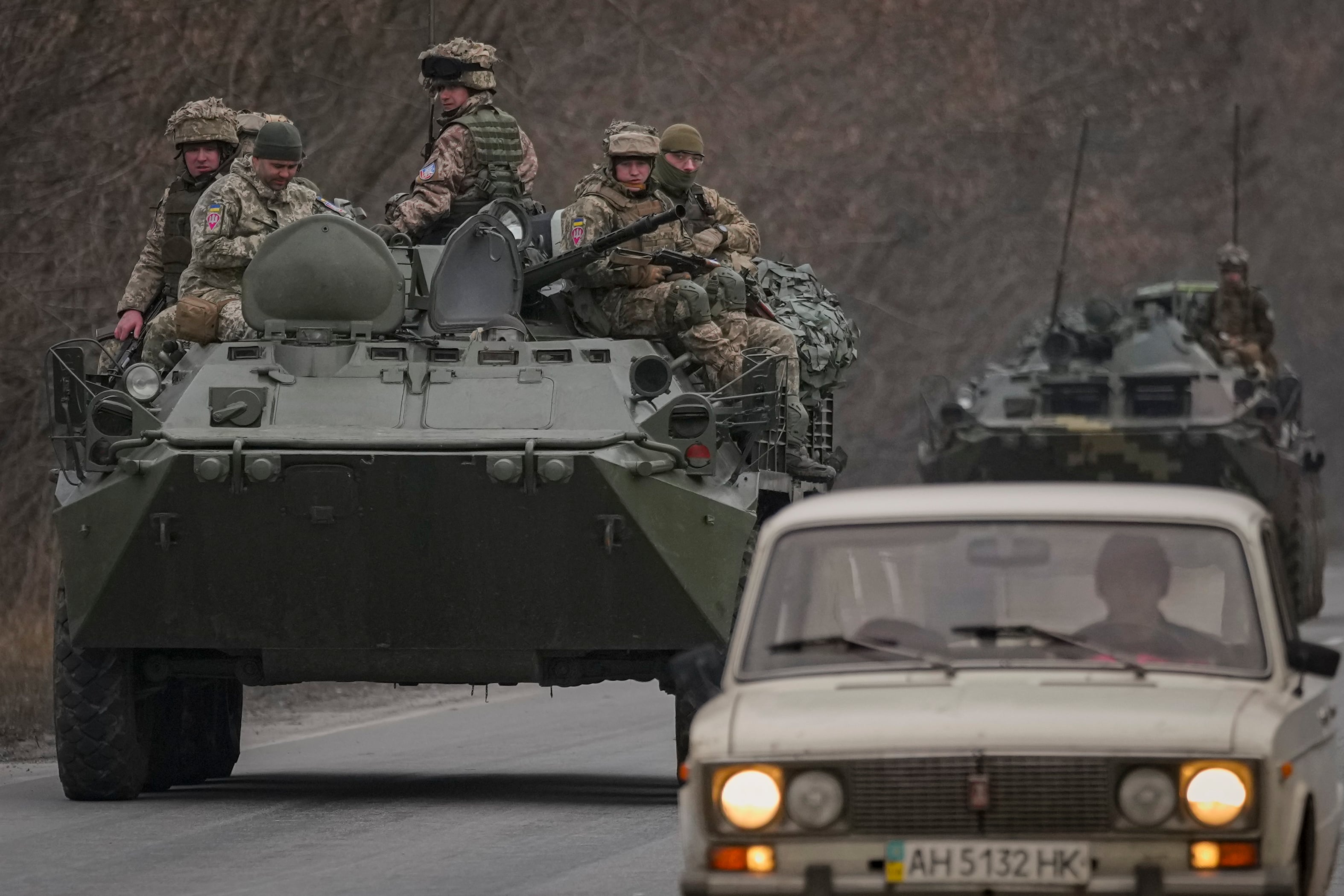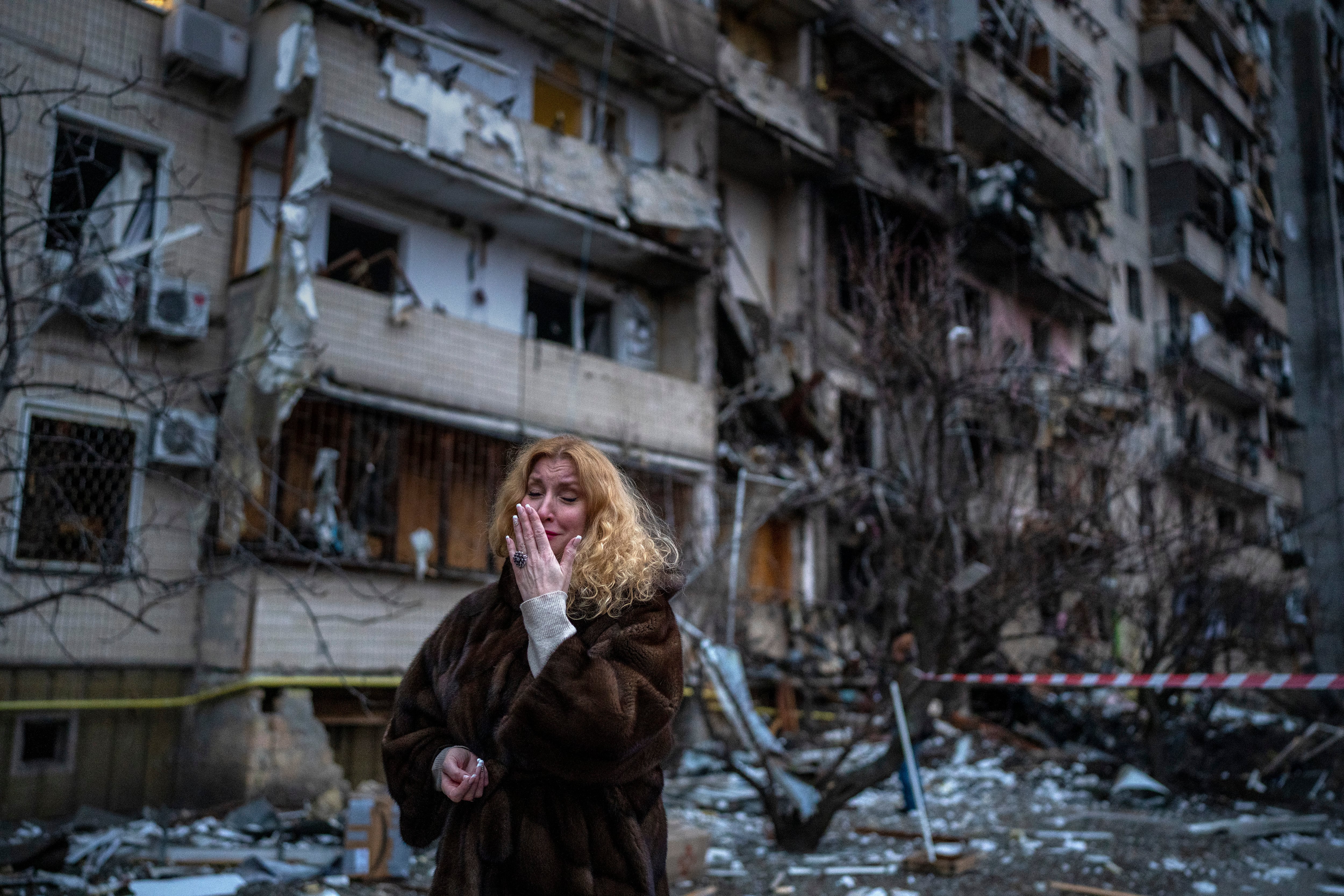Russia pressed its invasion of Ukraine to the outskirts of the capital Friday after unleashing airstrikes on cities and military bases and sending in troops and tanks from three sides in an attack that could rewrite the global post-Cold War security order.
As Russian forces entered the capital Kyiv’s Obolon district, the Kyiv Independent news organization reported that the Ukrainian Ministry of Defense was asking residents “to not leave their house and prepare Molotov cocktails,” according to a tweet from the news agency.
“Make Molotov cocktails, neutralize the occupier!” the country’s Defense Ministry tweeted.
Among the signs that the Ukrainian capital was increasingly threatened, the military said Friday that a group of Russian spies and saboteurs was seen in a district of Kyiv about three miles north of the city center. Earlier, the military said that Russian forces had seized two Ukrainian military vehicles and some uniforms and were heading toward the city to try to infiltrate under the guise of being locals.
Explosions sounded before dawn in Kyiv as Western leaders scheduled an emergency meeting and Ukraine’s president pleaded for international help to fend off an attack that could topple his democratically elected government, cause massive casualties and ripple out damage to the global economy.
Kyiv mayor Vitaly Klitschko said at least three people were injured when a rocket hit a multi-story apartment building in Ukraine’s capital on Friday, starting a fire.
Fearing a Russian attack, many of the capital’s residents took shelter deep underground in metro stations. People brought sleeping bags and blankets, dogs and crossword puzzles as they sought safety in the makeshift bomb shelters.

Ukrainian President Volodymyr Zelenskyy said that the Russian military’s claim it is not targeting civilian areas is “a lie.” He said that military and civilian areas in Ukraine are both being hit by Russian attacks.
Zelenskyy said the government had information that “subversive groups” were encroaching on the city, and U.S. Secretary of State Antony Blinken said Kyiv “could well be under siege” in what U.S. officials believe is a brazen attempt by Russian President Vladimir Putin to install his own regime.
Zelenskyy vowed that his military will keep fighting back and he ordered a full mobilization. He said 137 people, troops and civilians, have been killed and hundreds more wounded since the invasion began.
As Russian troops continued pressing their offensive Friday, intense fighting also raged in the country’s east.
Russian troops entered the city of Sumy near the border with Russia that sits on a highway leading to Kyiv from the east. The regional governor, Dmytro Zhivitsky, said Ukrainian forces fought Russian troops in the city overnight, but other Russian convoys kept rolling west toward the Ukrainian capital.
“Military vehicles from Sumy are moving toward Kyiv,” Zhivitsky said. “Much equipment has passed through and is heading directly to the west.”
RELATED

Zhivitsky added that another northeastern city, Konotop, was also sieged. He urged residents of the region to fight the Russian forces.
As air raids sirens sounded in Kyiv early Friday, guests of a hotel in the city center were directed to a makeshift basement shelter, lined with piles of mattresses and bottles of water. Workers, all local university students, served tea and cookies to the guests. Some people ducked out to a courtyard to smoke or get fresh air.
“We’re all scared and worried. We don’t know what to do then, what’s going to happen in a few days,” said one of the workers, Lucy Vashaka, 20.
The Russian military claims it has destroyed 118 Ukrainian military assets since the beginning of its assault on its neighbor and as it pushes into the outskirts of Kyiv.
The claim could not be independently verified and was not confirmed by Ukraine amid a flurry of claims and counterclaims by each side.
Russian Defense Ministry spokesman Maj. Gen. Igor Konashenkov said Friday that among the targets were 11 Ukrainian air bases, 13 command facilities, 36 air defense radars, 14 air defense missile systems, 5 warplanes, 18 tanks and warships.
However, U.K. Defense Secretary Ben Wallace rejected Russian claims of success on the first day of its invasion of Ukraine, saying it had “failed to deliver” on its day one objectives.
Wallace told Sky News that the Western assessment is that Russia had failed to take its major objectives and is behind on its timetable for advance.
“They’ve lost over 450 personnel,’’ he said.
Russia’s invasion of Ukraine began early Thursday with a series of missile strikes, many on key government and military installations, quickly followed by a three-pronged ground assault. Ukrainian and U.S. officials said Russian forces were attacking from the east toward Kharkiv, Ukraine’s second-largest city; from the southern region of Crimea, which Russia annexed in 2014; and from Belarus to the north.
U.S. President Joe Biden was to meet Friday morning with fellow leaders of NATO governments in what the White House described as an “extraordinary virtual summit” to discuss Ukraine.
French President Emmanuel Macron said Friday that France and its European allies have decided to “inflict very severe blows on Moscow,” further sanctioning individuals and targeting finance, energy and other sectors. The legal texts for the sanctions will be finalized and submitted for approval to EU foreign ministers later Friday.
Macron also said the EU has decided on economic aid for Ukraine in the amount of 1.5 billion euros ($1.68 billion).
The French president also called the Belorussian government “an accomplice” in Russia’s military invasion of Ukraine, and said it will also be targeted.

Ukraine’s nuclear energy regulatory agency says that higher than usual gamma radiation levels have been detected in the area near the decommissioned Chernobyl nuclear plant, after it was seized by the Russian military.
The State Nuclear Regulatory Inspectorate said Friday that higher gamma radiation levels have been detected in the Chernobyl zone, but didn’t provide details of the increase.
It attributed the rise to a “disturbance of the topsoil due to the movement of a large amount of heavy military equipment through the exclusion zone and the release of contaminated radioactive dust into the air.”
Ukrainian authorities said that Russia took the plant and its surrounding exclusion zone after a fierce battle Thursday.
Russian Defense Ministry spokesman Maj. Gen. Igor Konashenkov said Russian airborne troops were protecting the plant to prevent any possible “provocations.” He insisted that radiation levels in the area have remained normal.
The Vienna-based International Atomic Energy Agency said it was told by Ukraine of the takeover, adding that there had been “no casualties or destruction at the industrial site.”
The 1986 disaster occurred when a nuclear reactor at the plant 80 miles north of Kyiv exploded, sending a radioactive cloud across Europe. The damaged reactor was later covered by a protective shell to prevent leaks.
Also Friday, world leaders began to fine-tune a response meant to punish the Russian economy and its leaders, including President Vladimir Putin’s inner circle.
While there’s an acute awareness that a military intervention isn’t possible, for now, the strength, unity and speed of the financial sanctions — with the striking exception of China, a strong Russian supporter — signal a growing global determination to make Moscow reconsider its attack.

The prosecutor of the International Criminal Court says he is “closely following recent developments in and around Ukraine with increasing concern.”
Karim Khan issued a statement Friday on Twitter while on a visit to Bangladesh, where he is investigating crimes against Myanmar’s Rohingya minority.
Khan said he alerted “all sides conducting hostilities on the territory of Ukraine” that Ukraine has accepted the court’s jurisdiction.
That means “my office may exercise its jurisdiction over and investigate any act of genocide, crime against humanity or war crime committed within the territory of Ukraine since 20 February 2014 onwards,” Khan added.
Geoff is the managing editor of Military Times, but he still loves writing stories. He covered Iraq and Afghanistan extensively and was a reporter at the Chicago Tribune. He welcomes any and all kinds of tips at geoffz@militarytimes.com.









